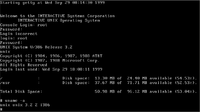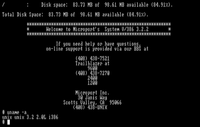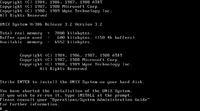Difference between revisions of "Unix SYSVr3"
(→SCO UNIX 3.2) |
m (avoid redir) |
||
| (28 intermediate revisions by 3 users not shown) | |||
| Line 1: | Line 1: | ||
| − | + | '''Unix System V, Release 3''' was released in 1987. The final version was Release 3.2 in 1988. | |
SVR3 included: | SVR3 included: | ||
* STREAMS | * STREAMS | ||
| − | * Transport Layer Interface (TLI) network API (TCP/IP | + | * Transport Layer Interface (TLI) network API ([[TCP/IP]], ''sockets'', NFS and BSD network tools were added by dictributors) |
* Remote File System (RFS) | * Remote File System (RFS) | ||
| − | * File System Switch (FSS) virtual file system mechanism | + | * File System Switch (FSS) virtual [[file system]] mechanism |
| − | * Static shared libraries, early implementation with mkshlib and COFF | + | * 2K file system (optionally) |
| − | * ID (Installable | + | * Static shared [[library|libraries]], early implementation with ''mkshlib'' and COFF |
| + | * ID (Installable [[Driver]]s) subsystem (actually, kernel re-linking from the set of object files) | ||
| + | * [[XENIX]] compatibility on i386 (and early [https://en.wikipedia.org/wiki/Intel_Binary_Compatibility_Standard iBCS] compatibility) | ||
| + | == Sys V R3 on AT&T 3B2 == | ||
| − | + | The [https://en.wikipedia.org/wiki/3B_series_computers#3B2 AT&T 3B2] computer was a "porting base" for the Release 3. Thanks to Seth J. Morabito an [https://loomcom.com/3b2/emulator.html AT&T 3B2/400 Simulator] is now a part of [[SIMH]]. It can run "real" AT&T UNIX System V Release 3 on the simulator. Source code is also avaialable (but may be a subject to copyright). | |
| + | |||
| + | It includes full SGS for WE-32000 CPU. | ||
| + | |||
| + | There was also a Wollongong WIN3B TCP/IP software (not AT&T's TCP/IP implementation) for Nicom Interlan 3B2 Ethernet card. | ||
| − | https://loomcom.com/3b2/ | + | See more at [https://loomcom.com/3b2/index.html The AT&T 3B2 Computer] archive. |
== Sys V R3 on i386 == | == Sys V R3 on i386 == | ||
| Line 18: | Line 25: | ||
=== AT&T Sys V/386 === | === AT&T Sys V/386 === | ||
| − | + | V/386 3.2.3 for AT&T 6386 machine. (Not tested on emulators) | |
| + | |||
| + | Available at bitsavers.org: [http://bitsavers.org/bits/ATT/SYSV_386/ binaries] | ||
| + | |||
| + | Includes SGS package: | ||
| − | + | * C Software Development System 4.1.6 9/26/88 | |
| − | === Everex ESIX | + | === Everex ESIX === |
| − | + | [https://en.wikipedia.org/wiki/Everex Everex] ESIX overview: [https://www.tuhs.org/Usenet/comp.unix.i386/1989-October/002257.html Let's Talk ESIX] | |
=== Interactive Systems Corporation 386/ix === | === Interactive Systems Corporation 386/ix === | ||
| − | + | [[File:Interactive 32.png|thumb|200px|INTERACTIVE UNIX boot]] | |
| − | https://virtuallyfun.com/2010/02/09/fun-with-interactive-unix/ | + | System V V/386 Release 3.2 made by [https://en.wikipedia.org/wiki/Interactive_Systems_Corporation Interactive Systems Corporation] |
| + | |||
| + | A [https://virtuallyfun.com/2010/02/09/fun-with-interactive-unix/ blog post] about this version. | ||
# uname -a | # uname -a | ||
unix unix 3.2 2 i386 | unix unix 3.2 2 i386 | ||
| − | Includes | + | Includes X Window with Motif and Looking Glass desktop developed by Visix Software. |
| + | |||
| + | Includes SGS package: | ||
| + | |||
| + | * C Software Development System 4.1.5 10/3/89 | ||
=== Microport Unix === | === Microport Unix === | ||
| − | + | [[File:Microport SYSVR32 boot.png|thumb|200px|Microport SYSVR32 boot]] | |
| − | https:// | + | Microport's System V/386 3.2.2 made by [https://en.wikipedia.org/wiki/Microport_(software) Microport]. Plain vanilla version, very close to AT&T 3.2 sources. No BSD extensions, no X Window. SGS and TCP/IP are not available (yet?). |
| − | https://archive.org/download/MicroportSystemVDocumentation | + | Available at archive.org: [https://archive.org/download/microport binaries] and [https://archive.org/download/MicroportSystemVDocumentation documentation] |
| − | + | May fail on many emulators, it does something strange with emulated VGA. To avoid this, choose a machine configuration with CGA display adaptor. | |
| − | + | May fail on emulated i386. Select a i486. | |
| − | + | See also: [[Microport System V]] about R2 port to i286. | |
| − | + | === Wyse === | |
| + | [[File:Wyseboot.png|thumb|200px|Wyse System V boot]] | ||
| − | + | [https://en.wikipedia.org/wiki/Dell_Wyse Wyse] was a manufacturer of the terminals and multiport serial hardware. Also Wyse was a player on the Unix market. In 2011 an incomplete 5" diskette set [https://virtuallyfun.com/wordpress/2012/12/07/wyse-unix-lives-again-sort-of/ was found]. Later someone found a more complete distributive on a QIC cassete. In 2015 a [https://virtuallyfun.com/wordpress/2015/09/19/virtualization-challenge-ii/ challenge] to run it in emulator was organized. Finally Wyse Unix was [https://virtuallyfun.com/wordpress/2015/10/12/wyse-unix-virtualized/ virtualized] in 2015. | |
| + | |||
| + | Like Microport version it has an issues with emulated VGA and i386. | ||
Wyse System V version 3.2.1A | Wyse System V version 3.2.1A | ||
| − | + | It includes a full SGS Package | |
| − | + | *C Software Development System 4.1.5 3/31/88 | |
| − | + | Also it includes TCP/IP, BSD networking utilities and man pages set. | |
| − | + | == Sys V R3 on RS/6000 == | |
| + | |||
| + | There was an IBM [[AIX]] Version 3 (also known as AIX/6000), based on System V Release 3, for their POWER-based RS/6000 platform. | ||
| + | |||
| + | == Sys V R3 on MIPS == | ||
| + | |||
| + | MIPS [https://en.wikipedia.org/wiki/MIPS_RISC/os RISC/os] was a System V Release 3 for MIPS architecture with BSD extensions. | ||
| + | |||
| + | == External links == | ||
| + | |||
| + | === Documentation === | ||
| − | + | * [http://bitsavers.trailing-edge.com/pdf/att/unix/System_V_Release_3/ System V Release 3] | |
| + | * [http://www.bitsavers.org/pdf/att/unix/System_V_386_Release_3.2/ System V 386 Release 3.2] documentation at Bitsavers | ||
| + | * [http://www.bitsavers.org/pdf/att/unix/System_V_386_Release_3.2/UNIX_System_V_386_Release_3.2_Release_Notes_1988.pdf UNIX System V 386 Release 3.2 Release Notes] | ||
| − | == | + | == Source == |
| − | + | * [https://loomcom.com/3b2/source_code_provision.html AT&T Source Code Provision Install] for 3B2 | |
| + | * [https://archive.org/details/ATTUNIXSystemVRelease4Version2 Core source code of System V.3 for 3B2] (which was the base platform for this version) | ||
{{Nav Unix}} | {{Nav Unix}} | ||
[[Category: Unix OS's]] | [[Category: Unix OS's]] | ||
Latest revision as of 17:34, 21 October 2023
Unix System V, Release 3 was released in 1987. The final version was Release 3.2 in 1988.
SVR3 included:
- STREAMS
- Transport Layer Interface (TLI) network API (TCP/IP, sockets, NFS and BSD network tools were added by dictributors)
- Remote File System (RFS)
- File System Switch (FSS) virtual file system mechanism
- 2K file system (optionally)
- Static shared libraries, early implementation with mkshlib and COFF
- ID (Installable Drivers) subsystem (actually, kernel re-linking from the set of object files)
- XENIX compatibility on i386 (and early iBCS compatibility)
Contents
Sys V R3 on AT&T 3B2
The AT&T 3B2 computer was a "porting base" for the Release 3. Thanks to Seth J. Morabito an AT&T 3B2/400 Simulator is now a part of SIMH. It can run "real" AT&T UNIX System V Release 3 on the simulator. Source code is also avaialable (but may be a subject to copyright).
It includes full SGS for WE-32000 CPU.
There was also a Wollongong WIN3B TCP/IP software (not AT&T's TCP/IP implementation) for Nicom Interlan 3B2 Ethernet card.
See more at The AT&T 3B2 Computer archive.
Sys V R3 on i386
AT&T Sys V/386
V/386 3.2.3 for AT&T 6386 machine. (Not tested on emulators)
Available at bitsavers.org: binaries
Includes SGS package:
- C Software Development System 4.1.6 9/26/88
Everex ESIX
Everex ESIX overview: Let's Talk ESIX
Interactive Systems Corporation 386/ix
System V V/386 Release 3.2 made by Interactive Systems Corporation
A blog post about this version.
# uname -a unix unix 3.2 2 i386
Includes X Window with Motif and Looking Glass desktop developed by Visix Software.
Includes SGS package:
- C Software Development System 4.1.5 10/3/89
Microport Unix
Microport's System V/386 3.2.2 made by Microport. Plain vanilla version, very close to AT&T 3.2 sources. No BSD extensions, no X Window. SGS and TCP/IP are not available (yet?).
Available at archive.org: binaries and documentation
May fail on many emulators, it does something strange with emulated VGA. To avoid this, choose a machine configuration with CGA display adaptor.
May fail on emulated i386. Select a i486.
See also: Microport System V about R2 port to i286.
Wyse
Wyse was a manufacturer of the terminals and multiport serial hardware. Also Wyse was a player on the Unix market. In 2011 an incomplete 5" diskette set was found. Later someone found a more complete distributive on a QIC cassete. In 2015 a challenge to run it in emulator was organized. Finally Wyse Unix was virtualized in 2015.
Like Microport version it has an issues with emulated VGA and i386.
Wyse System V version 3.2.1A
It includes a full SGS Package
- C Software Development System 4.1.5 3/31/88
Also it includes TCP/IP, BSD networking utilities and man pages set.
Sys V R3 on RS/6000
There was an IBM AIX Version 3 (also known as AIX/6000), based on System V Release 3, for their POWER-based RS/6000 platform.
Sys V R3 on MIPS
MIPS RISC/os was a System V Release 3 for MIPS architecture with BSD extensions.
External links
Documentation
- System V Release 3
- System V 386 Release 3.2 documentation at Bitsavers
- UNIX System V 386 Release 3.2 Release Notes
Source
- AT&T Source Code Provision Install for 3B2
- Core source code of System V.3 for 3B2 (which was the base platform for this version)
| v • d • e UNIX Versions, Vendors and Related |
|---|
| Research Unix PDP-7 UNIX • V1 • V2 • V3 • V4 • V5 • V6 • V7 • V8 • V9 • V10 • LSX • MINI-UNIX • Unix/32V
AT&T - CB-UNIX • PWB/UNIX • USG UNIX • System III • System IV • System V BSD - 2.9 BSD • 2.10 BSD • 2.11 BSD • 3BSD • 4BSD • 4.1 BSD • 4.2 BSD • 4.3 BSD • 4.4 BSD BSD Descendants 386BSD • NetBSD • FreeBSD • OpenBSD • NeXTSTEP • Darwin |
| Other - xv6 • AMIX • SunOS • Solaris • ULTRIX • A/UX • XENIX • AIX • Dell UNIX |


